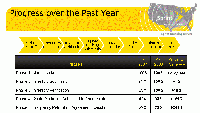2GHZ BAS relocation gains momentum
The professional video industry's #1 source for news, trends and product and tech information. Sign up below.
You are now subscribed
Your newsletter sign-up was successful

The 2GHz Broadcast Auxiliary Service (BAS) relocation project has gained significant momentum with impressive gains in key benchmarks, including broadcasters submitting quote packages, executed frequency relocation agreements and fulfilled equipment orders, according to Sprint Nextel.
In filing the first of its FCC-mandated bimonthly BAS relocation project updates April 1, the company provided the commission with a detailed summary of its progress. According to the report, between March 2007 and March 2008:
- the number of broadcasters submitting quote packages has climbed more than 120 percent;
- the number of frequency relocation agreements (FRA) executed has increased by more than 240 percent; and
- the number of equipment orders fulfilled has grown by more than 250 percent.
Additionally, 21 markets have transitioned to digital BAS operation on 12MHz channels between 2025MHz and 2110MHz. Many more markets, including several of the top 50 DMAs, are poised to cut over to the new band within the next 60 days, according to the company.
While the report shows that some of the markets due to make a March 2008 transition failed to do so, in many cases, a single station that hadn’t completed its switchover delayed the entire market. For example, in the Orlando market six of seven stations are ready to cut over.
The original deadline for the 2GHz BAS relocation project was September 2007. The company and broadcasters have been working under a series of 30-day waivers of the original deadline. In March, the commission said it would give the parties one year to complete the project, provided they made necessary adjustments to the relocation to accommodate companies that have purchased slices of soon-to-be freed up BAS spectrum commonly used for electronic newsgathering (ENG).
The professional video industry's #1 source for news, trends and product and tech information. Sign up below.
